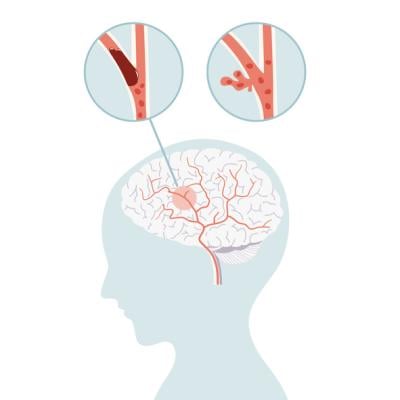
Getty Images
February 12, 2024 — VST Bio Corp. a leader in the development of innovative biologics to treat acute and chronic cardiovascular disease, presented data from a recent large animal study performed by VST Bio and Yale University demonstrating that a single iv bolus of VST-002 led to meaningful reduction in brain damage and improved function in an advanced model of ischemic stroke.
Dr. Federico Corti, from the Cardiovascular Research Center of Yale University, presented data which showed that a single bolus of humanized anti-Syndecan 2 antibody (VST-002), administered either 3 hours or 6 hours after ischemia led to ~60% reduction of stroke damage as visualized by magnetic resonance imaging, with all measures being statistically significant over control animals. Histological analysis at 72 hours post-stroke confirmed a significant reduction of edema and area of necrosis in both early and delayed therapy groups. These findings indicate that anti-Sdc2 mAb promotes neuroprotection and suggest that this therapy could be used both in patients undergoing early reperfusion as well as outside the current reperfusion window guidelines. Furthermore, the treatment was safe with no observed toxicities. The study was performed by an independent CRO, blinded to treatment assignment.
VST Bio Chief Executive Officer Krisztina Zsebo, PhD, said, "VST-002 human antibody therapy is being initially developed to treat ischemic stroke patients. The current standard-of-care is either thrombolytic therapy when given within the first 4.5 hours of stroke, or thrombectomy given within 24 hours. However, many hospitals don't offer thrombectomy because it requires specialist doctors, leaving the majority of patients ineligible for conventional treatment. VST-002 may offer an additional path to preserve brain function and improve recovery after ischemic stroke".
Prof. Dr. Michael Simons of Yale University, chair of the Scientific Advisory Committee, commented: "The humanized anti-Syndecan 2 monoclonal antibody therapy has shown consistent efficacy in normalizing vascular patency in various preclinical assays and models while preserving normal vasculature1,2. A normalization of vascular permeability in acute stroke results in reduced local and systemic inflammation as well as decreased edema formation. As a result, there is a significant reduction of stroke size, even when VST-002 antibody therapy is initiated late after the onset of stroke. Reducing edema, inflammation, and secondary injury after stroke could have a meaningful benefit for stroke patient outcomes."
For more information: www.vst-bio.com


 November 14, 2025
November 14, 2025 









